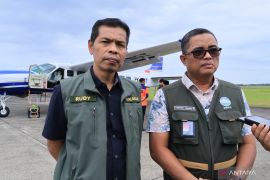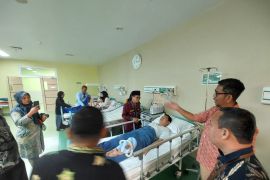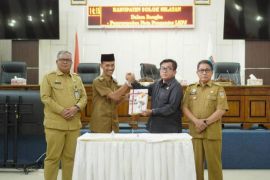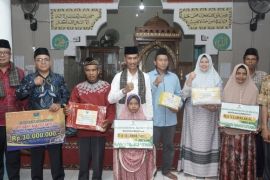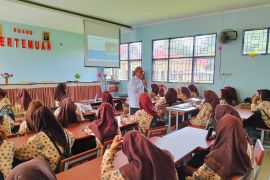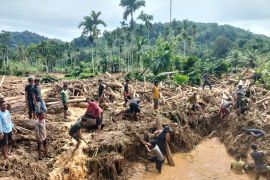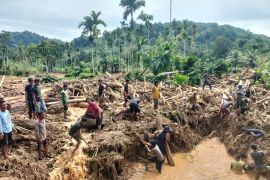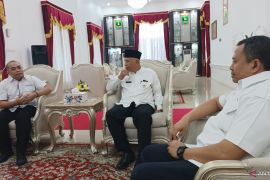
West Sumatra Readiness implements new normal era
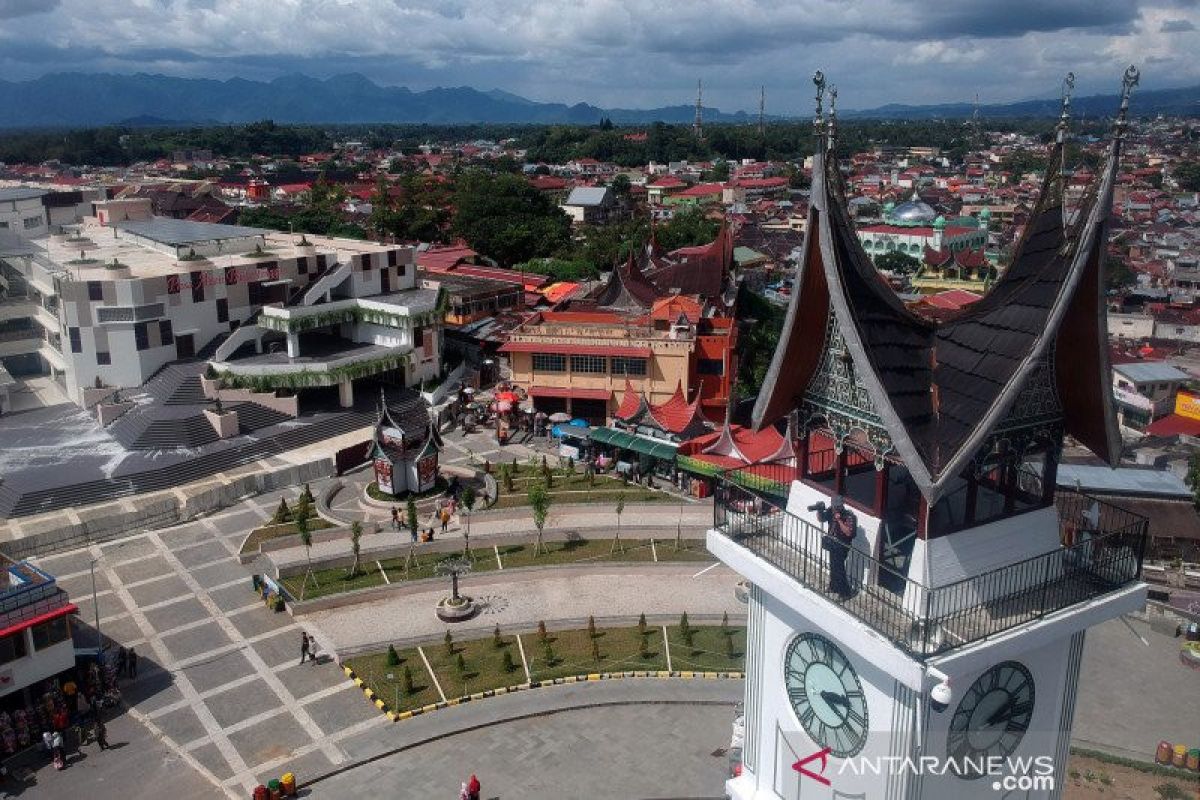
Padang (ANTARA) - Large-scale Social Restrictions (PSBB) in W Sumatra have been imposed for 44 days from April 22 to May 7, 2020 in order to break the chain of transmission of Corona Virus Disease (COVID-19).
PSBB is divided into three phases, PSBB phase I takes place from April 22 to May 5, 2020, then the W Sumatra Provincial Government decides to extend phase II PSBB from May 6 to May 29, 2020 and phase III from May 30 to June 7 2020.
Since the first case was announced on March 26, 2020 until June 6, 2020 there were 618 positive COVID-19 patients in W Sumatra, 27 people died, 336 people recovered and the rest are still undergoing treatment and isolation.
Of the 618 people who confirmed positive the biggest case occurred in Padang, which until June 6, 2020 there were 424 positive residents, 195 people were cured, 20 people died and the rest undergoing treatment and isolation.
The biggest cluster occurred in Pasar Raya Padang so that swab tests were conducted on 1,772 traders and around 300 traders were positive.
Since the PSBB, restrictions were enforced on various community activities in various sectors ranging from worship, transportation, work, education, to tourism.
Even in Padang the city government closed tourist attractions, entertainment place, and most of the government agencies implemented working from home.
Economic Impact
The economic sector fell due to the implementation of the PSBB because limited activity referring to the results of a survey of the Faculty of Social and Political Sciences (FISIP) of Andalas University in Padang which found as much as 52 percent of residents of W Sumatra experienced a decrease in income due to the COVID-19 pandemic.
"Some of the jobs that experienced a drastic decrease in income were small traders, MSMEs, casual daily laborers, employees with non-permanent salaries, drivers, motorcycle taxi and housemaids," said Coordinator of the COVID-19 FISIP Unand Emergency Response Team Dr. Aidinil Zetra.
According to him, out of 1,007 respondents interviewed, only 36 percent had a steady income during COVID-19 and there were 12 percent of respondents who experienced an increase in income.
"The most significant decreases in income are small traders reaching 29 percent, MSMEs by 18 percent, casual daily workers 16 percent and targeted employees 13 percent," he said.
Online motorcycle taxi respondents were found to have decreased income by more than 50 percent and in normal conditions their income was only Rp1.8 million or still below the Regional Minimum Wage.
Ironically, when 52 percent of respondents complained about a decrease in income, 70 percent of respondents experienced an increase in expenditure of between 10 to 25 percent.
Additional expenditure occurs because of changes in the way to shop online, resulting in additional costs.
Besides that the purchase of vitamins, drugs, sanitation, and data packages also make more expenditure.
Meanwhile, according to the Head of Bank Indonesia of W Sumatra Wahyu Purnama, it took at least five months to recover the W Sumatra economy affected by COVID-19.
"Previously, he was estimated that the W Sumatra 2020 economy would grow at 4.97 percent, but with the occurrence of this pandemic it dropped to around 2.3 to 2.7 percent this year," he said.
According to him the figure of 2.3 to 2.7 percent was realized if this outbreak could end in June and there had been economic activity in July 2020.
Handling Efforts
In handling COVID-19, at least W Sumatra implemented four strategies, such as tracing positive contact history of patients for swab testing, testing of sample tests at the Biomedical Laboratory, Diagnostics and Integrated Research of Infectious Diseases at Andalas University.
Then do isolation and quarantine in a number of facilities provided for positive patients with mild symptoms and conduct treatment in two referral hospitals for positive patients with moderate and severe symptoms.
In the concept of epidemics, the first principle that must exist is to establish the diagnosis as quickly as possible with an accurate method.
Therefore the existence of the Unand Laboratory is an effort to break the chain of distribution of COVID -19 in W Sumatra.
"Rapid test will help the government in breaking the chain of transmission," said Head of Integrated Biomedical Diagnostic and Research Laboratory for Infectious Diseases Andalas University Dr. Andani Eka Putra.
Therefore, when there was a surge in cases in W Sumatra, Andani was happy because the transmission could be broken.
"For example, there are 23 people are positive of Covid-19, then the chain can be broken immediately from 23 people who are sources of infectious infections," he said.
He assess the main problem of COVID-19 was not from the number of deaths but the spread quickly, so it needed accurate detection to prevent and break the chain of transmission.
Baca juga: Ini tanggapan Manajemen Bandara Minangkabau perihal temuan penumpang pesawat positif COVID-19
New Normal
After 44 days of implementing the PSBB based on an evaluation carried out the W Sumatra Provincial Government finally decided the new normal implementation starting June 8, 2020.
"The new normal is a new pattern of productive life so that people can carry out daily activities ranging from work, school, worship using the safe principle of COVID-19," said W Sumatra Governor Irwan Prayitno.
According to him the key word in the new normal application is the discipline of all parties to follow the health protocol related to COVID-19.
"Such as wear a mask, keep physical distance, wash hands, reduce direct meetings," he said.
Irwan conveyed that until now there was no clarity from the experts and WHO when the COVID-19 vaccine would be found and at least it took up to two years so that people's lives might not continue to be at home.
"Waiting COVID-19 end is impossible, therefore enforce new normal is inevitability," he said.
Baca juga: Satpol PP turunkan seluruh personel sosialisasikan Perwako tentang pola hidup baru
He explained that there are three requirements for a new normal from WHO, review the aspects of epidemiology, health systems and community readiness.
For epidemiology, he ensured that the development of COVID-19 in W Sumatra was controlled and sloping.
"From all regencies and cities in W Sumatra it has decreased, except in Padang and it is only in Pasar Raya," he said.
For Pasar Raya, it is a local transmission and in W Sumatra since the implementation of the PSBB there have been no more import cases brought from outside W Sumatra.
Regarding the health system, he said that W Sumatra has seven referral hospitals, two specialty hospitals for COVID-19, the laboratory, and PPE.
Next about the readiness of the community he said he would prepare regional regulations to guide life in the new normal period.
Irwan added protocols had also been prepared starting from the government environment, places of worship, markets, schools and tourist attractions.
Transleted by: Mutiara Ramadhani
Baca juga: Kesiapan Sumbar menerapkan era normal baru
Baca juga: Usai PSBB tahap III Padang berlakukan masa transisi pada 8-13 Juni 2020
Pewarta: Miko Elfsiha
Editor: Maswandi
COPYRIGHT © ANTARA 2026

